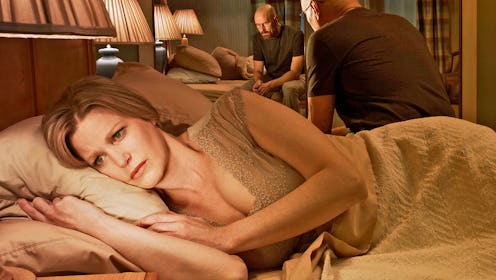Entertainment
The Internet Hated These TV Women in 2013

Kate Aurthur at Buzzfeed recently published an article titled "16 Female TV Characters Who Were Cyberbullied in 2013". Among the women on the list were Dana Brody from Homeland, Amanda Clarke from Revenge, and, of course, Skyler White from Breaking Bad. Aurthur detailed the hate that these characters received from the Internet, whether the hate come in forms of memes, message board comments, and even comments from television critics.
Unless you lived under a rock (or, you know, have no interest in television at all) you probably already knew the characters who made this list. (I didn't even watch Breaking Bad and I know that most people found Skyler White's presence irritating.) Hating on these female characters has become a part of television fan's vocabulary — I know that I'm guilty of throwing shade at Amanda on Revenge and a handful of other characters on this list. I don't really have a problem with the Internet culture spewing venom at the actions of characters — personally, hate-watching comprises about 50 percent of my television viewing habits (that's the explanation I give for watching the final season of 90210, or really any season of 90210) and it's natural to find certain characters completely insufferable. For every beloved character, there is going to be another whose actions you can't comprehend and whose presence makes you roll your eyes. That's what keeps television interesting.
Aurthur's piece reveals something a little more troubling than what television characters we as viewers tend to hate on, and that's why and how we hate on them. There is a pattern with the women on this list, and it's that they're all complex ladies who don't fit the mold of our typical heroine or our typical antagonist. It's not like we hate on these characters for being bad people — if that were the case, we would spend way more time criticizing Walter White than his wife. Dana from Homeland could have been the silent, rarely seen daughter of Brody, and we would have probably liked her just fine (if we even bothered to notice her at all).
It's a little sad that the women on this list seem to be criticized for being active participants in their respective show's plot points. These mostly supporting characters are seen as throwing a wrench in the plans of the leads, often (though not always) a male character. In fact, a major criticism of the women on these shows is that they are taking up too much time. Their stories are not valued by the audience.
If this was the case with a handful of female characters, it would be easy to chock this issue up to the TV writers who happened to create an annoying character. But the fact that this list contains 16 women is a bit disturbing.
But what about the guys? It's hard to overlook the many television men who are annoying, or take up too much screen time, or who aren't your typical hero. Quinn from Scandal receives a ton of TV hate for her decisions, yet President Fitz, a character who consistently makes reckless decisions that send the other characters into a tailspin (see the Season 3 premiere, perhaps?) hardly gets as much of the Internet loathing. Have we really not progressed so far that we can't see imperfect, complicated women as something more than a nuisance?
One of the more disturbing aspects of Aurthur's piece was the way in which the Internet voiced their irritation at these characters. Aurthur cites a ton of criticism of these women that are laced with violent imagery and blatant sexism. In the case of Amanda on Revenge, TV criticism of her death was met with headlines such as "The Bitch Had It Coming." Nice, Internet. That's not to mention the fantasy violence that many viewers wanted to take out on loathed characters like Emma from The Following. I wasn't exactly in the Emma or Amanda fan club, but I think we can agree that there's a pretty gross anti-women undertone to the backlash against these fictional ladies. The horrible comments that the Internet has for the women of television who are less than the perfect ideal of beauty, like Lena Dunham's Girls character Hannah, is astounding.
The place that women have in our media — even fictional ones — reflects how we see women in everyday life. If the Internet is a reflection of our culture and the women who are not deemed "perfect" are criticized in such a hateful matter, well, I'm a little worried about what that says about us.